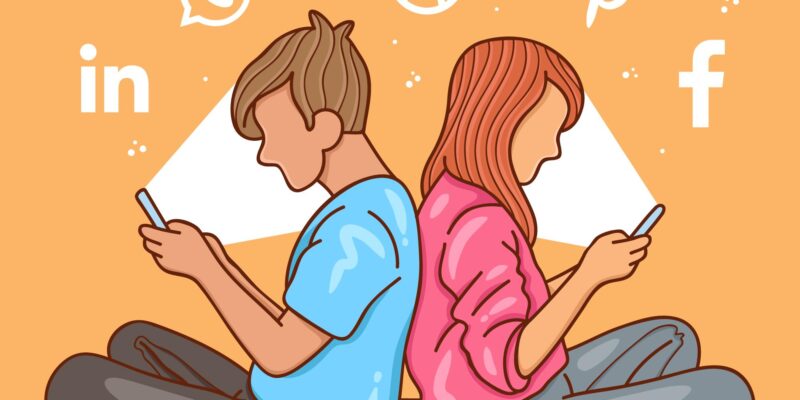Social media has become an essential part of our lives. Whether we’re scrolling through Instagram, sharing a tweet, or liking a Facebook post, it’s hard to imagine a world without it. While social media offers numerous benefits, such as keeping us connected and informed, it also has a significant impact on our mental health and relationships. The line between connection and disconnection can sometimes blur, leading to confusion, stress, and emotional strain.
Social Media and Mental Health: The Hidden Struggles
Social media platforms allow us to share moments of happiness, achievements, and experiences, but they often portray an unrealistic picture of life. We scroll past carefully curated images of “perfect” vacations, flawless selfies, and successful milestones, which can sometimes leave us feeling inadequate or left out.
These feelings of comparison can erode our self-esteem and contribute to mental health issues like anxiety and depression.
-
The Pressure to Keep Up:
The constant need to present an idealized version of ourselves on social media can be exhausting. Studies show that comparing ourselves to others online can trigger negative feelings. Whether it’s comparing body images, career accomplishments, or social lives, the pressure to keep up can take a toll on our emotional well-being.
-
The Fear of Missing Out (FOMO):
Social media feeds often showcase social gatherings, parties, or group outings that can make us feel excluded. If we see others living their best lives while we’re stuck at home or struggling with personal challenges, it can lead to feelings of loneliness or inadequacy.
This “fear of missing out” (FOMO) can affect both mental health and relationships by causing us to over-focus on others’ experiences and overlook our own.
-
Cyberbullying and Negative Comments:
Online harassment or judgment from strangers, friends, or acquaintances can severely impact mental health. Constantly reading negative or hurtful comments can make people feel isolated and unworthy, damaging their sense of self-worth.
The anonymity of the internet can make bullying worse, especially for those who are already vulnerable.
Social Media and Relationships: The Double-Edged Sword
While social media can help us maintain relationships across distances, it can also introduce new challenges. The ways we interact with our partners, friends, and family members have drastically changed, sometimes in ways that are not healthy for our relationships.
-
Communication Breakdown:
Communication is the foundation of any relationship, but social media can sometimes interfere with genuine connections. Texts, posts, and messages may lack the emotional depth or nuance of face-to-face conversations. Misunderstandings can arise more easily, leading to conflicts that might not have occurred otherwise.
-
Relationship Comparison:
Just as social media can cause personal comparisons, it can also influence how we view our relationships. When we see “couple goals” or “perfect relationships” online, we may begin to measure our own relationships against unrealistic standards. This can result in dissatisfaction or pressure to meet others’ expectations rather than focusing on our unique connection with a partner.
-
Social Media Addiction and Neglect:
Overuse of social media can lead to neglecting real-life relationships. Constantly checking notifications, scrolling endlessly, or engaging in online drama takes time and energy away from the people around us. If we prioritize digital interactions over in-person ones, it can strain our relationships and lead to feelings of neglect or disconnection.
Practical Tips for Managing Social Media’s Impact
1. Set Boundaries: It’s important to set limits on how much time we spend on social media. Try setting specific time slots for checking social media and stick to them. Disconnecting from the digital world for a few hours a day can give you more time to focus on your mental health and nurture your relationships.
2. Be Mindful of Your Emotions: Pay attention to how social media makes you feel. If a particular post, account, or platform triggers negative emotions, consider unfollowing or muting those sources. Curating your feed to include content that uplifts or inspires you to create a healthier environment for your mental well-being.
3. Focus on Quality, Not Quantity: Instead of worrying about the number of followers or likes, focus on the meaningful relationships you have. Engage with people who support and care for you, and let go of the pressure to impress or compete. Real connections are more valuable than online validation.
4. Communicate Openly: If social media is affecting your relationship, talk about it openly with your partner or loved ones. Honest communication about how you both use social media can help set boundaries and prevent misunderstandings.
5. Practice Digital Detox: Consider taking regular breaks from social media to recharge. Use this time to focus on activities that support your mental health, like journaling, exercising, or spending quality time with family and friends. A digital detox can help you reconnect with yourself and others more deeply.
Conclusion
While social media has transformed how we connect with others, it’s important to be mindful of its effects on both mental health and relationships. By being conscious of how we engage with social media, we can mitigate its negative impacts and create a healthier, more balanced digital life. Remember, it’s okay to take a step back and prioritize your well-being. Building healthy relationships, both online and offline, starts with nurturing yourself first.
